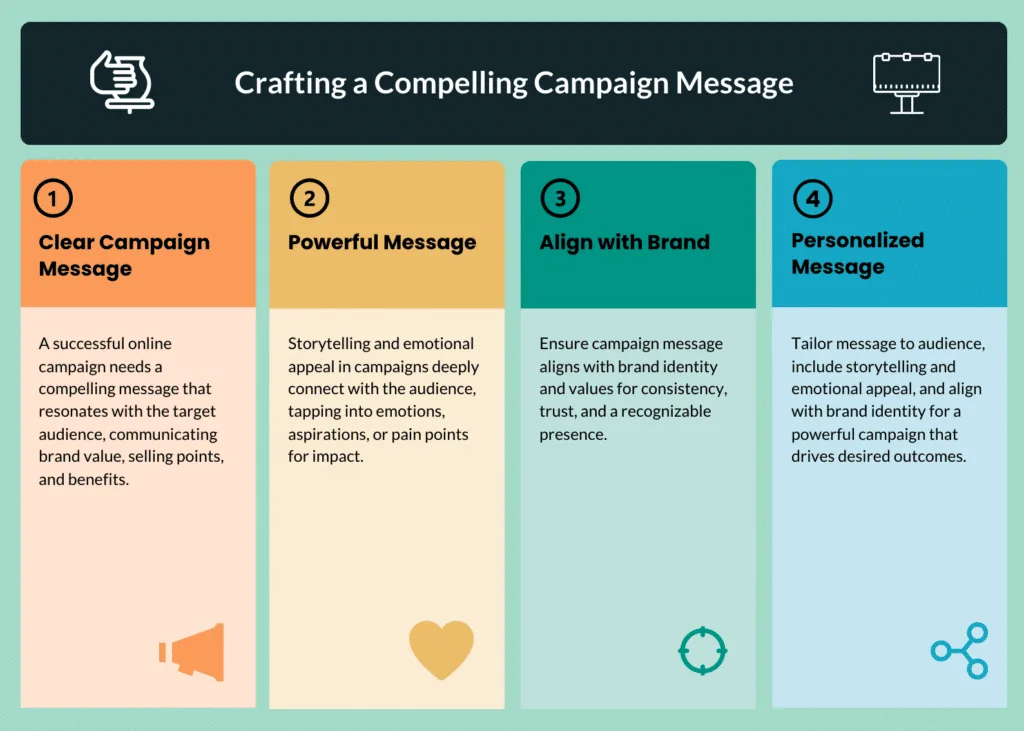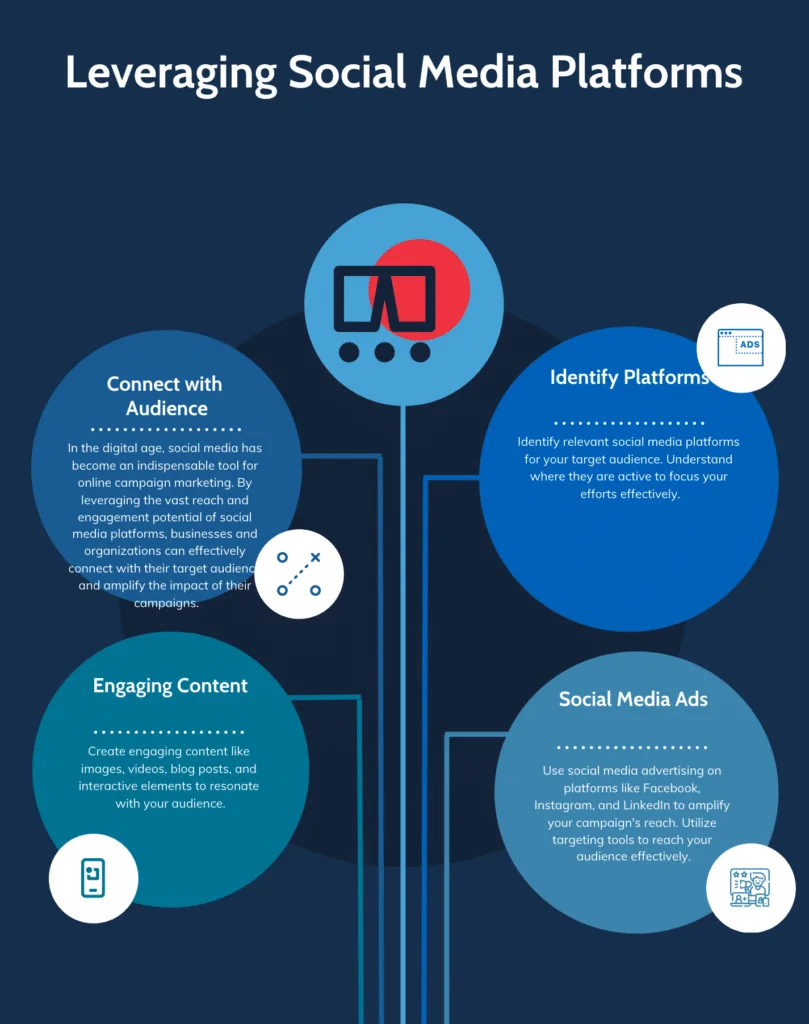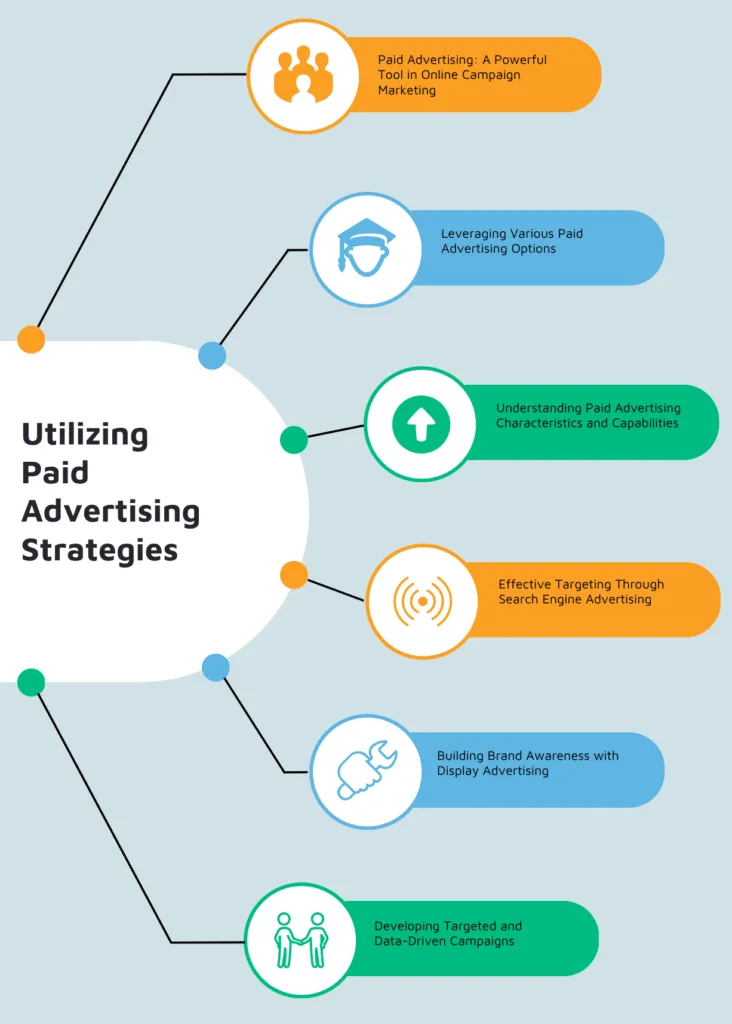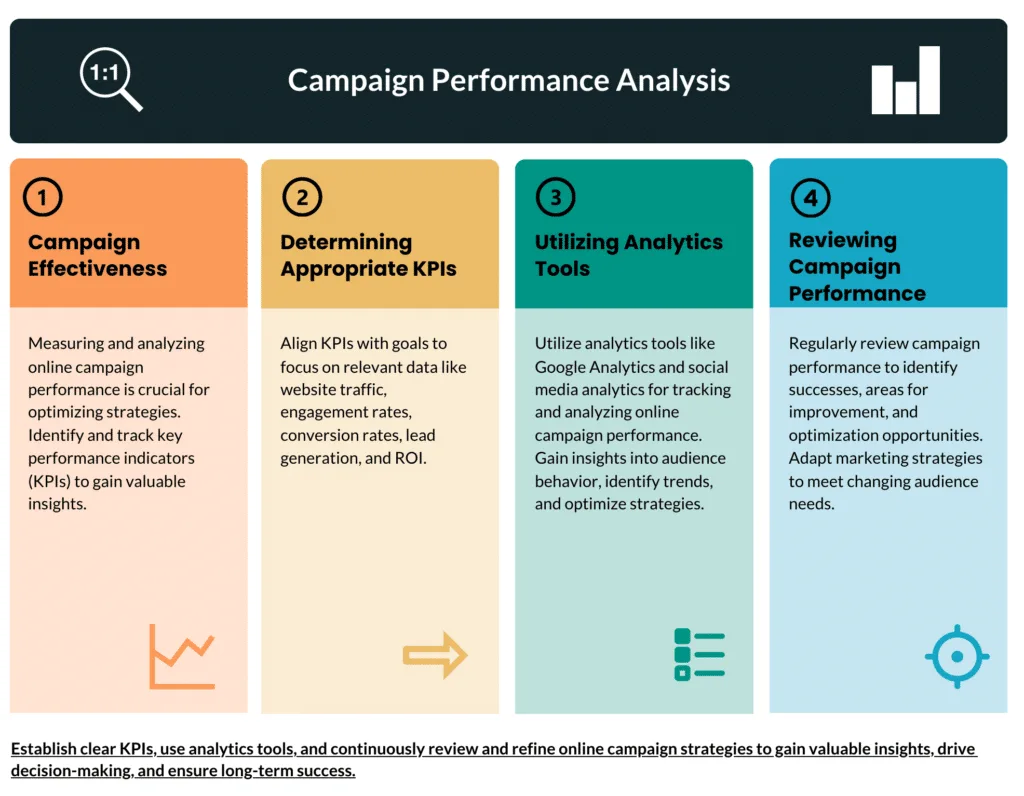What is Online Campaign Marketing?
Businesses and organizations of all sizes have recognized the immense potential of online campaign marketing to reach and engage their target audiences.
As the world becomes increasingly interconnected through the internet and social media, the importance of effective online campaigns has become paramount.
Online campaign marketing offers a multitude of benefits for businesses and organizations. It allows for targeted and personalized outreach, enabling organizations to connect with their audience in a more meaningful and impactful way.
Moreover, online campaigns provide measurable data and analytics, allowing marketers to track the performance of their efforts and make data-driven decisions to optimize their strategies.
With the ability to reach a global audience and the potential for viral content, online campaign marketing has become a powerful tool for driving brand awareness, generating leads, and ultimately, achieving business objectives.
As the digital landscape continues to evolve, the need for businesses to adapt and embrace online campaign marketing strategies has become increasingly crucial. By leveraging the power of the internet and digital platforms, organizations can effectively engage with their target audience, build brand loyalty, and ultimately, drive business growth.
Key Takeaways
- Online campaign marketing is a powerful tool for businesses to reach their target audience.
- Defining your target audience is crucial for creating a successful campaign.
- Crafting a compelling message that resonates with your audience is key to driving conversions.
- Social media platforms are a valuable tool for reaching and engaging with your audience.
- Measuring and analyzing campaign performance is essential for continuous improvement.
Defining Your Target Audience

Effective online campaign marketing begins with a deep understanding of your target audience. Knowing who your customers are, what they value, and how they prefer to engage with your brand is the foundation for creating a successful online campaign.
Conducting thorough market research is essential in defining your target audience.
This process involves gathering data and insights about your potential customers, their demographics, interests, pain points, and buying behaviors. By creating detailed buyer personas, you can gain a comprehensive understanding of your audience and tailor your campaign messaging and strategies accordingly.
Tailoring your online campaign to the specific needs and preferences of your target audience is crucial for achieving maximum engagement and conversion rates.
This may involve adapting your content, tone, and communication channels to resonate with your audience more effectively.
For example, if your target audience is primarily millennials, you may want to focus on creating visually-appealing, mobile-friendly content and leveraging social media platforms that are popular among this demographic.
By deeply understanding your target audience and crafting your online campaign to meet their unique needs, you can establish a stronger connection with your customers, build brand loyalty, and ultimately, drive the desired outcomes for your business or organization.
Crafting a Compelling Campaign Message

At the heart of successful Online Campaign Marketing lies a clear and compelling message that resonates with your target audience.
Developing a campaign message that effectively communicates your brand’s value proposition, unique selling points, and the benefits you offer to your customers is essential for capturing their attention and inspiring action.
Incorporating storytelling and emotional appeal into your campaign message can be a powerful way to connect with your audience on a deeper level. By crafting a narrative that taps into the emotions, aspirations, or pain points of your target audience, you can create a more memorable and impactful campaign that resonates with them on a personal level.
Ensuring that your campaign message aligns with your brand’s identity and values is crucial for maintaining consistency and building trust with your audience.
Your message should reflect your brand’s unique personality, tone, and messaging, reinforcing your brand’s positioning and helping to establish a strong, recognizable presence in the minds of your customers.
By crafting a compelling campaign message that is tailored to your target audience, incorporates storytelling and emotional appeal, and aligns with your brand’s identity, you can create a powerful Online Campaign Marketing that effectively communicates your value proposition and drives the desired outcomes for your business or organization.
Leveraging Social Media Platforms

Leveraging the vast reach and engagement potential of social media platforms, businesses and organizations can effectively connect with their target audience and amplify the impact of their campaigns.
The first step in leveraging social media for your Online Campaign Marketing is to identify the most relevant platforms for your target audience.
Different social media channels cater to diverse demographics, interests, and communication preferences. By understanding where your audience is most active and engaged, you can focus your efforts on the platforms that are most likely to yield the desired results.
Once you have identified the appropriate social media channels, the next step is to create engaging and shareable content that resonates with your audience.
This may involve a mix of visual content, such as images and videos, as well as written content, such as blog posts, social media updates, and interactive elements like polls or quizzes. By crafting content that is visually appealing, informative, and entertaining, you can increase the likelihood of your audience engaging with and sharing your campaign.
Utilizing social media advertising can further amplify the reach and impact of your Online Campaign Marketing.
Platforms like Facebook, Instagram, and LinkedIn offer powerful targeting and optimization tools that allow you to precisely reach your desired audience, measure the performance of your ads, and adjust your strategies accordingly. By leveraging paid social media advertising, you can extend the visibility of your campaign and drive more targeted traffic to your website or desired conversion points.
By effectively leveraging social media platforms, creating engaging content, and utilizing paid advertising strategies, you can significantly enhance the reach and impact of your online campaign, ultimately driving greater brand awareness, lead generation, and conversions for your business or organization.
Optimizing Your Website for Conversions
In the context of Online Campaign Marketing, your website serves as the central hub for your digital presence, where your audience can engage with your brand, learn about your offerings, and ultimately, take the desired actions.
Ensuring that your website is optimized for conversions is crucial for the success of your online campaign.
A user-friendly and visually appealing website design can greatly influence the engagement and conversion rates of your Online Campaign Marketing.
By prioritizing a clean, intuitive layout, responsive design, and visually striking elements, you can create a positive user experience that encourages your audience to explore your website and take the desired actions.
Implementing effective call-to-action (CTA) strategies on your website is another key aspect of optimization for conversions.
CTAs are the buttons, links, or prompts that guide your audience to take specific actions, such as making a purchase, signing up for a newsletter, or requesting a consultation. By strategically placing CTAs throughout your website, using clear and compelling language, and ensuring they are visually prominent, you can effectively guide your audience towards the desired conversion points.
Optimizing the content and layout of your website can also have a significant impact on conversion rates.
This may involve conducting A/B testing to determine the most effective messaging, imagery, and page structure, as well as incorporating search engine optimization (SEO) best practices to improve the visibility and discoverability of your website in search engine results.
| Strategy | Description | Metric |
|---|---|---|
| Define your target audience | Identify the specific group of people you want to reach with your campaign | Demographics |
| Set clear goals | Determine what you want to achieve with your campaign | Conversion rate |
| Create compelling content | Develop content that resonates with your target audience | Engagement rate |
| Use social media | Utilize social media platforms to reach a wider audience | Reach |
| Optimize for search engines | Ensure your content is easily discoverable through search engines | Organic traffic |
| Utilize email marketing | Send targeted emails to your audience to promote your campaign | Open rate |
| Partner with influencers | Collaborate with influencers to promote your campaign to their followers | Impressions |
| Run paid advertising | Invest in paid advertising to reach a larger audience | Click-through rate |
| Track and analyze results | Monitor the success of your campaign and make adjustments as needed | ROI |
| Continuously improve | Learn from your results and make improvements for future campaigns | Conversion rate |
By prioritizing a user-friendly website design, implementing effective CTA strategies, and optimizing the content and layout of your website, you can create a seamless and conversion-focused online experience for your audience, ultimately driving the desired outcomes for your Online Campaign Marketing.
Utilizing Paid Advertising Strategies

Paid advertising can be a powerful tool in the arsenal of online campaign marketing, allowing businesses and organizations to amplify the reach and impact of their campaigns. By leveraging various paid advertising options, such as search engine advertising, display ads, and social media ads, you can effectively target and engage your desired audience.
Exploring the different paid advertising options available and understanding their unique characteristics and targeting capabilities is crucial for developing a cost-effective and impactful campaign.
For example, search engine advertising, such as Google Ads, can be highly effective in reaching users who are actively searching for products or services related to your business. Display advertising, on the other hand, can be used to build brand awareness and reach a broader audience through visually engaging banner ads or retargeting campaigns.
Developing a targeted and data-driven paid advertising campaign is essential for maximizing the return on your investment.
This involves conducting thorough research, defining your campaign objectives, and creating ad content and targeting strategies that resonate with your target audience. By leveraging audience segmentation, demographic targeting, and behavioral data, you can ensure that your paid advertising efforts are reaching the right people at the right time.
Tracking and analyzing the performance of your paid advertising campaigns is crucial for making informed decisions and optimizing your strategies. By utilizing analytics tools and platforms, you can monitor key metrics such as click-through rates, conversion rates, and return on ad spend (ROAS), and make adjustments to your campaigns accordingly.
This data-driven approach allows you to continuously refine and improve the effectiveness of your paid advertising efforts, ensuring that your online campaign marketing strategies are delivering the desired results.
By strategically leveraging paid advertising as part of your online campaign marketing mix, you can amplify the reach and impact of your campaigns, drive targeted traffic to your website or desired conversion points, and ultimately, achieve your business objectives.
Engaging with Your Audience through Email Marketing
Email marketing remains a powerful and versatile tool in the world of online campaign marketing. By leveraging the power of email, businesses and organizations can effectively engage with their target audience, nurture leads, and drive conversions.
Building a robust and segmented email list is the foundation of a successful email marketing strategy. By collecting email addresses from your website visitors, social media followers, and other lead-generation sources, you can create a valuable database of contacts who have expressed interest in your brand or offerings.
Segmenting your email list based on factors such as demographics, interests, or buying behavior can further enhance the personalization and relevance of your email communications.
Creating compelling and personalized email content is crucial for engaging your audience and driving the desired actions.
This may involve crafting informative and engaging newsletters, promotional offers, or targeted email campaigns that address the specific needs and pain points of your audience. By incorporating elements such as personalized subject lines, dynamic content, and clear calls to action, you can increase the likelihood of your emails being opened, read, and acted upon.
Automating your email marketing campaigns can significantly improve the efficiency and effectiveness of your online campaign marketing efforts. By leveraging email automation tools and workflows, you can streamline the process of sending targeted, personalized emails to your audience at the right time, based on their behavior or specific triggers.
This can include welcome sequences for new subscribers, abandoned cart reminders, or targeted follow-up campaigns based on user engagement.
By building a robust email list, creating compelling and personalized email content, and automating your email marketing campaigns, you can effectively engage with your audience, nurture leads, and drive conversions as part of your overall online campaign marketing strategy.
Measuring and Analyzing Campaign Performance

Measuring and analyzing the performance of your online campaign is essential for understanding its effectiveness and making data-driven decisions to optimize your strategies. By identifying and tracking key performance indicators (KPIs), you can gain valuable insights into the impact of your campaign and make informed adjustments to improve its success.
Determining the appropriate KPIs for your online campaign is a crucial first step in the measurement and analysis process.
Depending on your campaign objectives, these KPIs may include metrics such as website traffic, engagement rates, conversion rates, lead generation, or return on investment (ROI). By aligning your KPIs with your specific goals, you can ensure that your performance tracking and analysis are focused on the most relevant and impactful data.
Utilizing analytics tools and platforms is essential for effectively tracking and analyzing the performance of your Online Campaign Marketing.
Tools like Google Analytics, social media analytics, and campaign-specific tracking platforms can provide a wealth of data and insights into the behavior and interactions of your audience. By analyzing this data, you can identify trends, pinpoint areas of success or improvement, and make informed decisions to optimize your campaign strategies.
Regularly reviewing and evaluating your campaign’s performance is crucial for continuous improvement. By analyzing the data and insights gathered, you can identify what’s working well, what needs to be adjusted, and where there are opportunities for further optimization.
This iterative process of review and refinement allows you to adapt your online campaign marketing strategies to the changing needs and preferences of your target audience, ensuring that your efforts remain effective and impactful over time.
By establishing clear KPIs, leveraging analytics tools, and continuously reviewing and refining your online campaign strategies, you can gain valuable insights that inform your decision-making and drive the long-term success of your online campaign marketing efforts.
Adapting and Refining Your Strategies for Continuous Improvement
The ability to adapt and refine your strategies is essential for maintaining a competitive edge and achieving sustained success.
As consumer behaviors, market trends, and technological advancements continue to shape the digital landscape, it is crucial for businesses and organizations to remain agile and responsive in their approach to online campaign marketing.
Regularly reviewing and evaluating the performance of your online campaign is the first step in the process of adaptation and refinement. By closely monitoring key metrics, analyzing user feedback, and identifying areas of strength and weakness, you can gain a comprehensive understanding of what is working well and where there is room for improvement.
This data-driven approach allows you to make informed decisions and implement targeted changes to your strategies.
Incorporating feedback and insights from your target audience is another crucial aspect of adapting and refining your online campaign marketing strategies. By actively engaging with your customers, soliciting their opinions, and addressing their pain points, you can gain valuable insights that can inform the evolution of your campaign.
This may involve adjusting your messaging, optimizing your content, or exploring new channels and tactics that better resonate with your audience.
Staying up-to-date with the latest trends, best practices, and emerging technologies in the world of online campaign marketing is essential for maintaining a competitive edge. By continuously educating yourself and your team, exploring new tools and platforms, and experimenting with innovative approaches, you can ensure that your strategies remain relevant, effective, and aligned with the evolving needs of your target audience.
By embracing a culture of continuous improvement, adapting your strategies based on data and audience feedback, and staying ahead of the curve in terms of industry trends and best practices, you can position your online campaign marketing efforts for long-term success.
This agile and responsive approach will enable you to navigate the dynamic digital landscape, capitalize on emerging opportunities, and ultimately, drive sustainable growth for your business or organization.
FAQs
What is online campaign marketing?
Online campaign marketing is the process of promoting a product, service, or brand through various digital channels such as social media, email, search engines, and websites.
What are the benefits of online campaign marketing?
Online campaign marketing can help businesses reach a wider audience, increase brand awareness, generate leads, and drive sales. It is also more cost effective than traditional marketing methods.
What are the 10 strategies for success in online campaign marketing?
The 10 strategies for success in online campaign marketing are: defining your target audience, setting clear goals, creating a compelling message, using multiple channels, optimizing your website, leveraging social media, using email marketing, creating valuable content, measuring your results, and continuously improving your campaigns.
How do you define your target audience?
To define your target audience, you need to identify the demographics, interests, behaviors, and needs of your ideal customers. This can be done through market research, customer surveys, and analyzing your website and social media analytics.
What is a compelling message?
A compelling message is a clear and concise statement that communicates the unique value proposition of your product or service. It should be tailored to your target audience and highlight the benefits of your offering.
What are some examples of multiple channels?
Multiple channels refer to using different digital platforms to reach your target audience. Examples include social media platforms like Facebook, Twitter, and Instagram, search engines like Google, email marketing, and display advertising.
What is website optimization?
Website optimization involves improving the user experience and functionality of your website to increase conversions. This can include improving page load times, optimizing for mobile devices, and creating clear calls to action.
What is social media leverage?
Social media leverage involves using social media platforms to promote your brand, engage with your audience, and drive traffic to your website. This can include creating shareable content, running social media ads, and using influencer marketing.
What is email marketing?
Email marketing is the process of sending targeted emails to your subscribers to promote your products or services. This can include newsletters, promotional emails, and automated email campaigns.
What is valuable content?
Valuable content is content that provides useful information or entertainment to your target audience. This can include blog posts, videos, infographics, and social media posts. It should be relevant to your brand and target audience.
How do you measure the results of your online campaigns?
You can measure the results of your online campaigns by tracking metrics such as website traffic, engagement rates, conversion rates, and ROI. This can be done through website analytics tools, social media analytics, and email marketing software.




